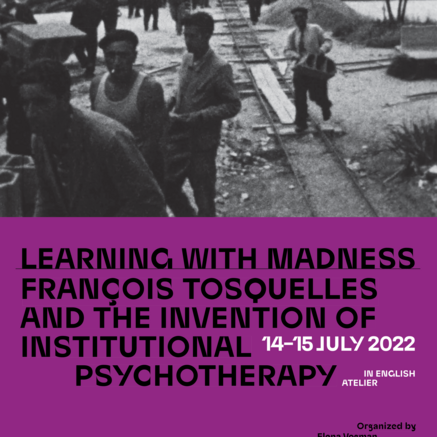
Atelier »Learning with Madness. François Tosquelles and the Invention of Institutional Psychotherapy« on 14-15 July 2022, In English
Organized by Elena Vogman and Marlon Miguel
In the context of the project ‘Madness, Media, Milieus. Reconfiguring the Humanities in Postwar Europe’, Bauhaus-Universität Weimar
Institutional Psychotherapy was a psychiatric reform movement and method. It employed innovative forms of group therapy and radically restructured the model of centralized psychiatric institutions, actively involving patients in these processes. It emerged as a practice of resistance during the German occupation of France, as over 50,000 patients of psychiatric hospitals fell prey to the National Socialist extermination policy. The Saint-Alban Clinic in Lozère was the point of departure for the Institutional Psychotherapy, initiated by the Catalan psychiatrist François Tosquelles together with resistance fighters and authors such as Georges Canguilhem and Paul Eluard. Media practices constituted concrete local forms of resistance: resistance both to the normalizing politics of traditional clinical institutions as well as to the disciplining of madness and its delineation from political, aesthetic, and epistemic dimensions.
Tosquelles’ films are just once case among the many media practices that were integrated along with the therapeutic complex that was orchestrated within the premises of Saint-Alban after the 1940s. Film, radio, television, and printed materials constituted key platforms for a counterpublic sphere that helped restore citizenship to patients deprived of most of civil rights. Like many of these different media, film blurred the lines segregating inner life and exterior, between authorship and spectatorship. Instead, a dialogical space emerged according to an anti-authoritarian logics. To further develop our understanding of Tosquelles’ films, it is significant to enrich the amateur, ethnographic and clinical approaches with comparative perspectives that include, among others, the cinéma direct of Mario Ruspoli. The specific nature of Tosquelles’ cinematic experiments calls for a reflection that articulates his psychiatric practice as no less eclectic than his understanding of the act of filmmaking.
Including a presentation of films and a series of talks by international scholars, the two-day workshop aims at exploring Tosquelles’ multidimensional practice, giving special attention to media as therapeutic instruments and processes of transference.
__________________________________
Day 1: Thursday, 14 July 2022 – ACC Galerie (Burgplatz 1, 99423 Weimar)
18:00 Introduction
by Elena Vogman and Marlon Miguel
18:15-19:30 Screening, Introduced by Carles Guerra
Carles Guerra, co-curator of the exhibition Francesc Tosquelles. Like a Sewing Machine in a Field of Wheat (CCCB, Barcelona, 8 April – 28 August 2022); curator of the exhibition The Tosquelles Album. A visual essay (Museum of Modern Art, Tarragona, 30 April – 3 July 2022)
François Tosquelles, La société lozérienne d'hygiène mentale (1954-1957), 39 m 36
François Tosquelles began filming domestic life and all sorts of events related to his professional environment in 1953. In the period up to 1958, he had realised a film depicting the radical transformations at the Saint-Alban psychiatric hospital, a film that revealed the therapeutic complex of so-called Institutional Psychotherapy and became known under the title La société lozérienne d'hygiène mental (1954-1957). After circulating in the confines of psychiatric institutions as well as in other places and among audiences that were unrelated to the hospital, the film took its final form.Carles Guerra, Suite en blanc et noir and Suite en couleur, remixed (1953-2022), 32 m 50
In Suite en Blanc et noir and Suite en couleur, remixed (1953-2022), the original footage newly digitized from two early films by Tosquelles has been edited in order to reconstruct the sequence of events captured by the camera. We can only guess who was passing Tosquelles’ camera and where and when these people met. To some extent, this edited version of Tosquelles’ original footage allows for two different forms of perception. On the one hand, we see the most eminent figures who have been involved in the advent of institutional psychotherapy at the beginning of this psychiatric revolution. On the other hand, we observe the footage as raw material, images subject to a scrutinizing gaze shaped by the obsessive search of a hidden narrative. The editing of this footage is as much an experiment as it is an attempt to elicit Tosquelles’ filmic practice and restore parts of the contextual environment that his camera traverses and encapsulates.
19:30-19:45 Short break
19:45-21:00 Presentation and discussion with Carles Guerra
Day 2: Friday, 15 July 2022 – Bauhaus-Universität Weimar (Berkaer Straße 1, 99425 Weimar)
10:00 Introduction
by Elena Vogman and Marlon Miguel
10:30-12:30 Panel I
12:30-14:00 Lunch break
14:00-15:30 Panel II
15:30-16:00 Coffee break
16:00-17:00 Final discussion
»Madness, Media, Milieus. Reconfiguring the Humanities in Postwar Europe« is sponsored by the Volkswagen Foundation and has its permanent basis at the Faculty of Media, Bauhaus-Universität Weimar.
All updates on the workshop and more information on the research project can be found on the website: www.uni-weimar.de/madness-media-milieus
[Zoom link for Friday, 15 July 2022: https://hu-berlin.zoom.us/j/68148385465?pwd=NXNWamxoMTZINTFlRzRQTTVuMC9Pdz09 (Meeting ID: 681 4838 5465; Password: 327521)]
Changes from color to monochrome mode
contrast not active
Changes the background color from white to black
Darkmode not active
Elements in focus are visually enhanced by an black underlay, while the font is whitened
Feedback not active
Halts animations on the page
Animations active